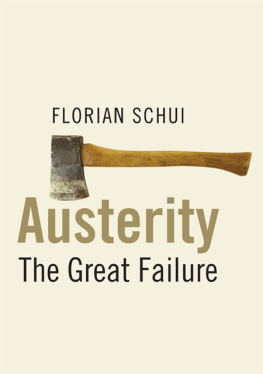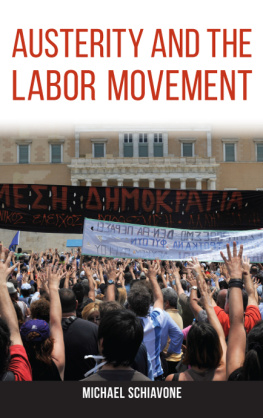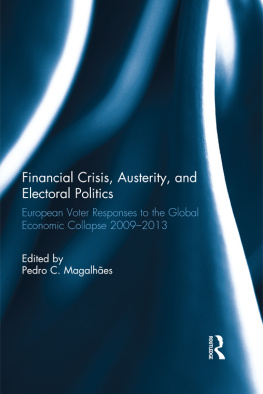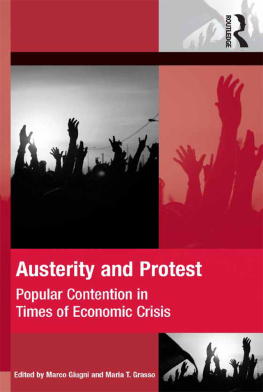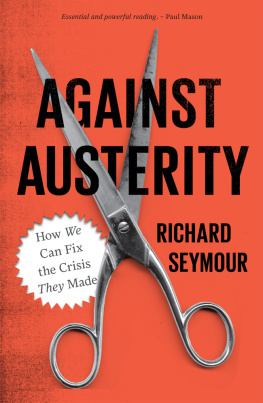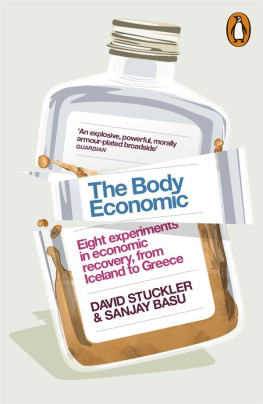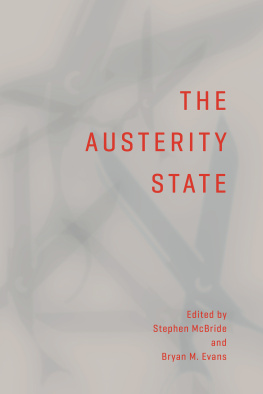

Copyright 2014 Florian Schui
The right of Florian Schui to be identified as author of this work has been asserted by him in accordance with the Copyright, Designs and Patents Act 1988.
All rights reserved. This book may not be reproduced in whole or in part, in any form (beyond that copying permitted by Sections 107 and 108 of the U.S. Copyright Law and except by reviewers for the public press) without written permission from the publishers.
For information about this and other Yale University Press publications, please contact:
U.S. Office:
Europe Office:
Set in Janson MT by IDSUK (DataConnection) Ltd
Printed in Great Britain by Gomer Press Ltd, Llandysil, Ceredigion, Wales
Library of Congress Cataloging-in-Publication Data
Schui, Florian, 1973
Austerity: the great failure/Florian Schui.
Pages cm
ISBN 978-0-300-20393-6 (cl : alk. paper)
1. Consumption (Economics)History. 2. ThriftinessHistory.
3. Saving and investmentHistory. 4. Economic policy
History. I. Title.
HC79.C6S263 2014
339.47dc23
2013041994
A catalogue record for this book is available from the British Library.
10 9 8 7 6 5 4 3 2 1
2018 2017 2016 2015 2014
For Cecilia
Contents
Introduction
The austerity policies that have been rolled out in many Western countries have brought all the pain of economic stagnation but hardly any of the promised benefits of debt reduction, renewed growth and prosperity. Nonetheless, support for such measures has remained strong among economists, politicians and substantial parts of the public. How can we explain this steadfastness in the face of economic failure? A way to make sense of this paradox is to place the current debates in historical perspective and look at the deep and ancient roots of arguments for austerity.
For all their topicality, today's controversies over austerity are not new. The notion that individuals, states and societies benefit from limiting their consumption is almost as old as humanity. The term austerity itself goes back to the ancient Greeks, and the question of how much consumption is too much or, indeed, too little was already on the minds of some of the foremost thinkers of antiquity. Since that time, it has remained a focus of political and economic arguments in all ages of Western civilisation, attracting the attention of a rather mixed group of thinkers that included the authors of the Bible, medieval ascetics, enlightened philosophers and modern economists. By reading the current debate as the latest replay of the centuries-old controversy about consumption we can more fully understand the arguments presented by both sides.
Today, the term austerity is often used to denote public spending cuts in general. This captures an important manifestation of austerity policies but it misses their main rationale. Austerity policies are proposed to restore balance in government finances and regain economic dynamism and competitiveness. The former objective is pursued mainly by cutting back on government expenditure that funds individual and collective forms of consumption: for example pensions, health care and education. Where taxes are increased this often leads to a reduction in private incomes and consumption. The second objective, stimulating growth, is mainly sought by lowering the cost of labour, that is, reducing wages and hence individual consumption. Renewed economic dynamism is also expected to result from the reduction of government expenditure and debt: a smaller state is believed to leave more space for private initiative and inspire confidence among private investors and consumers. Austerity policies have many facets but ultimately they are about abstinence from consumption.
Clearly, not all public spending cuts put into place under the label of austerity fall on consumption expenditure. Government spending for investment such as the building of bridges, roads and airports is sometimes reduced, but normally it is protected from cuts or even increased. Expenditure for consumption usually bears the brunt of cuts. This is chiefly because by far the greatest part of government expenditure is for forms of consumption. Any meaningful reduction of government expenditure must therefore mainly reduce these parts of the budget. Moreover, consumption expenditure is also often seen as more dispensable. It is generally accepted that cutting back on infrastructure will damage the prospects of economic recovery and long-term development.
In a similar way, while not all reforms intended to regain economic competitiveness focus on lowering the cost of labour, this is always an essential element. The deregulation of labour markets is mostly geared towards removing laws and institutions that protect workers and union rights and salaries. Labour usually finds itself in a weaker bargaining position in liberalised labour markets. Falling or stagnating wages are often an important result of deregulation. This makes it possible for companies to produce at a lower cost and become more competitive. The inevitable flip-side of this development is that many wage earners lose income and often have to cut back on consumption.
The current controversy about austerity policies is therefore ultimately about the question of whether or not rewards can be expected for abstaining from consumption. In this sense today's exchanges fit into a centuries-old tradition of consumption critique. Indeed, much of the historical commentary on this topic seems oddly familiar when we read it today. To be sure, much has changed since Aristotle, Aquinas and Voltaire pondered similar questions. Political systems were radically different and so were the ways in which societies and individuals satisfied their material needs: it was as normal for Aristotle that a substantial portion of society mainly women and slaves should be excluded from political power as it was for Aquinas that virtually all men and women of his time worked in agriculture and eked out a rather miserable living, without much hope of improvement. And even the much more familiar contexts in which Keynes or Hayek wrote were still different from ours in important respects. Placing the arguments of the past in their own context is therefore crucial to understanding them.
When we review past exchanges about consumption we are bound to encounter unfamiliar vantage points. For the question of how much consumption is right can be approached from many different angles. It is as much a moral, religious or political and even an aesthetic question as it is an economic one. Often the angle from which an author decides to approach the question already predetermines how he or she will answer it.
Today's debates offer a good example of such differences in perspective. The proponents of austerity are often cast as hard-nosed economic experts who advocate unpleasant but necessary measures. The quintessential austerian is the technocrat: the economics professor who turns prime minister in the hour of his country's greatest need, or the experts of the European Commission, the European Central Bank, the International Monetary Fund (IMF), and others who land in a nation's capital to save it from the brink of financial collapse. The considerable power which these experts wield rests primarily on their claim to superior knowledge and understanding of economic matters. Typically they are unelected officials, but large portions of the public support them because they feel safe in the hands of men and women who are well versed in the logic of capitalism and whose vision of the future is not blurred by sentimentalities.
Next page
